Zero carbon research team aims to change the world
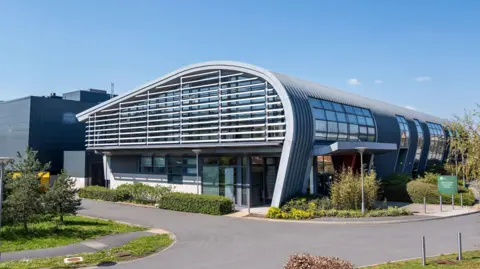 University of Nottingham
University of NottinghamSustainable air travel. Electric HGVs. Hydrogen-powered shipping.
These are just some of the projects researchers are expected to work on at the new Zero Carbon Innovation Centre (ZCIC) in the East Midlands.
Based at the University of Nottingham, with another site at Loughborough University, the centre's priority is to develop new "sustainable" transport technology to power the airplanes, lorries and ships that currently run on climate-damaging fossil fuels.
Transport is the biggest contributor to UK greenhouse gas emissions with increasing traffic outweighing the benefits of more efficient engines.
Leaders at the new centre says their aim is to close the gap between academic research and industrial application
The facility has funding commitments of more than £75m from industry, public and academic investment.
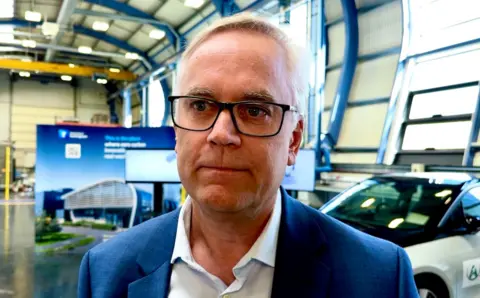
The largest space at the ZCIC is occupied by four manufacturing robots, an overhead crane and an electric car.
In offices labelled "incubation space" engineers and scientists are already hard at work, but the doors remain firmly closed to uninvited visitors.
The man in charge of strategy here, Prof Henner Wapenhans, explains their work is already too commercially sensitive to share.
"Our vision is to accelerate sustainability, to accelerate decarbonisation of the world and have an economic impact in the region," he says.
"By the end of year this facility will be buzzing with advanced manufacturing and assembly lines for electrical machines that could power ships or aircraft.
"I think within 10 to 20 years we're going to see sustainable aviation with zero emissions perhaps driven by hydrogen fuel.
"[We'll see] electrical machines which are much more powerful in a smaller space using new green fuels."
According to Prof Wapenhans, those machines could be quickly adapted and switched to provide engines for long distance transport on land or sea, as well as in the air.
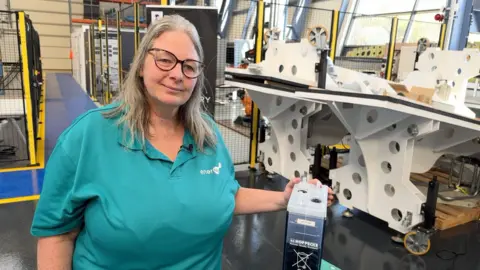
Some climate change campaigners worry that, too often, our search for solutions to the climate crisis centres on new technologies, which always seem to be "a decade away", rather than on changing how we live and exploiting existing proven technologies.
Prof Dani Strickland is part of the Loughborough team that is focusing on hydrogen production and storage.
She recognises the argument but says research into sustainable, cheap solutions is still essential.
"The existing solutions are often not market-ready and may be too expensive or not recyclable," she says.
"There's no point in developing all this technology and making it too expensive to buy or to use. That's why we're particularly proud of all the low-cost work we're doing."
As an example, she points to her team's production of a 3D-printed "battery electrolyser".
The battery stores electricity generated from renewable sources, such as solar. Once the battery is full, excess energy can be used to generate green hydrogen.
Three years ago it was a Masters project.
This year the university is shipping three containers to Malawi, the Ivory Coast and Zambia to provide hydrogen for clean cooking based on solar cells.
"[The centre] is all about creating a low carbon ecosystem," she says.
"You create this really exciting, vibrant community within the East Midlands to make things happen. It's about taking new technology and bringing it to market in a very short time-scale."
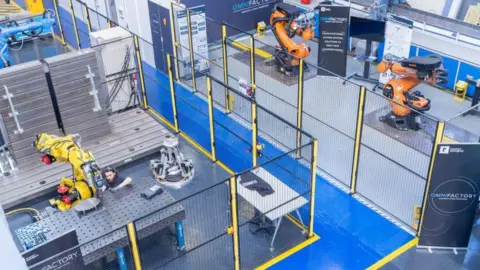 University of Nottingham
University of NottinghamThe centre sits near the university's Power Electronics and Machines Centre (PEMC) and a few hundred metres away from where they are building a new hydrogen propulsion lab which is due to open in 2026.
It is all part of a "zero carbon cluster" billed as "the place where zero carbon innovation drives real-world solutions."
Various industries will be able to use the cluster to test new technologies, allowing their staff to share ideas and skills with academic researchers at the top of their field.
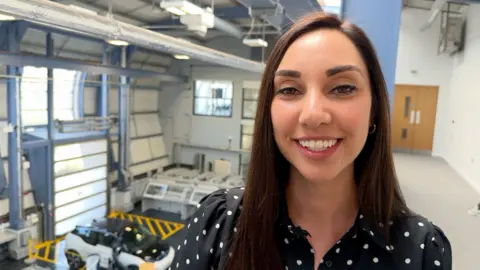
Katie Greenhalgh heads up green growth at East Midlands Freeport which has invested £6m in the ZCIC.
She says the centre fits with their goals of driving economic growth and attracting new businesses to the region.
She hopes it will also help them meet their commitments to sustainability and decarbonisation.
"This is one of the first investments we've made as a freeport," she says.
"We're definitely not shying away from a challenge. We have an airport, we have an old coal-fired power station, we have logistics and manufacturing.
"These sectors are really challenging to decarbonise but initiatives like this are creating the breakthrough technologies that we need in order to tackle all those really difficult to treat sectors."
Prof Wapenhans believes by helping to develop skills, the centre will boost jobs and make the region more competitive.
"The East Midlands has strong industry and a thriving SME [small and medium enterprise] supply chain, he says.
"There will be jobs from PhDs to the mechanics on the workbench."
Follow BBC Nottingham on Facebook, on X, or on Instagram. Send your story ideas to [email protected] or via WhatsApp on 0808 100 2210.
